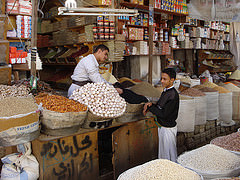MOTIVATION
In response to the 2007–2008 global food crisis, the Government of Yemen asked IFPRI to develop a National Food Security Strategy (NFSS). IFPRI, building on its previous work on food security in Yemen, provided technical support for the development of the strategy in close collaboration with the multi-ministerial Yemen Food Security Committee and with the support of the German Agency for International Cooperation (GIZ), the European Union, and the World Bank. In addition, with support from GIZ’s "One World, No Hunger" Initiative, IFPRI continues to provide evidence-based solutions for tackling hunger in times of war through technical assistance, research and analysis, capacity building, and helping coordinate high-level policy workshops.
RESULTS
Approved by Yemen’s cabinet early in 2011, the NFSS set clear goals for improving food security in the country by 2020 and provided a seven-point action plan for achieving these goals. The strategy was summarized in a set of briefs, accompanied by the Yemen Digital Food Security Atlas to facilitate the strategy’s visualization and communication.
OUTCOMES
- Through the support of GIZ, the Kiel Institute for the World Economy, and the CGIAR Research Program on Policies, Institutions, and Markets (PIM), IFPRI provided 70 students and government officials with relevant training in economic modeling and food security analysis. These efforts contributed to the Forecasting Unit of Yemen’s Ministry of Planning and International Cooperation (MoPIC) becoming a hub for economic modeling. In 2014, MoPIC analysts provided sound food policy analysis and evidence to the minister, which facilitated the approval of a US$553 million loan from the International Monetary Fund (IMF) to fund the government’s pro-growth and pro-poor reform.
- While the civil unrest of 2011–2012 and its aftermath delayed the implementation of the strategy, the government of Yemen used the NFSS to underpin its application for funding from GAFSP, resulting in a $36 million grant in 2013. Through the NFSS, the prime minister established the Higher Council of Food Security and a Technical Secretariat in May 2013, and designated it as the implementing agent of the strategy.
- To monitor the country’s progress on food security, IFPRI and MoPIC, in collaboration with GIZ, the International Fund for Agricultural Development (IFAD), and PIM, built the Yemen Spatial, which was launched in 2014. The Yemen Spatial monitors and evaluates progress on key food security indicators— such as calorie deficiency and child stunting—and strengthens food security by making data and information available to policy makers. IFPRI continues to assist MoPIC in maintaining the Yemen Spatial as a monitoring tool for food and nutrition security.
For more information on IFPRI's partnerships with Germany, please go to this brochure.



